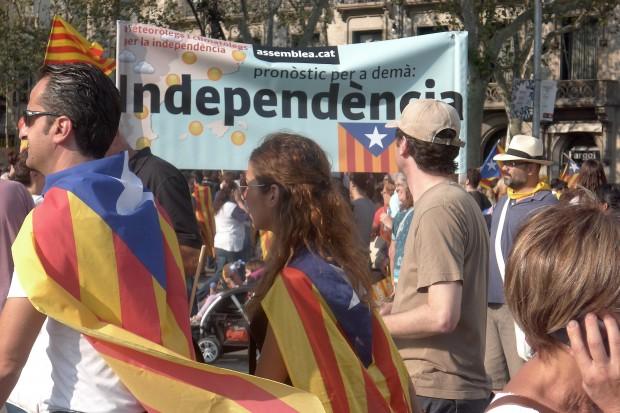Spain’s Catalonia region turns out in peaceful call for independence
As many as one million Catalonian Spaniards rallied for independence on Tuesday. (Photo by Gerry Hadden.)
In the Catalonia region of Spain, Sept. 11 has a meaning very different from the United States.
It’s a holiday when Catalans celebrate their history and sense of national identity. But this year it’s become a call for outright independence from Spain.
A million people, give or take, gathered at a march near Barcelona Tuesday. That’s nearly one out of seven Catalans. The region’s never seen anything like this.
The official slogan for this year’s celebration is, “Catalonia: Europe’s next independent nation!”
Catalonia, like Spain’s Basque Country, has had a movement for independence for centuries. But for the first time in modern history, polls suggest a majority of Catalans now want to secede from the Spanish union.
The catalyst? More than anything, the economic crisis. Despite huge federal budget cuts, Spain doesn’t have enough money to go around to pay for everything from schools to roads to hospitals.
“We contribute more taxes to the state,” said Barcelona resident Jordi Flor, “and we get less and less back.”
A woman named Rosa agreed.
“We’re sick of Spain. It’s over, Spain, Good bye!” she said.
Such rhetoric, this huge march, and Spain’s three-year-long financial nose dive have Spain’s ruling conservatives feeling unusually worried about the restive northeast.
“This march for independence is a dangerous path to go down,” said Alicia Camacho, a leader from the center right popular party. “It could lead to a rupture within Catalan society.”
But Catalan independence is hardly around the corner. Regardless of current sentiment, Catalonia still needs Madrid. The region has just asked the central government for a $7 billion bailout.
That helps explains why Catalonia’s president, Arthur Mas, a self-proclaimed Catalan nationalist, was a no-show at Tuesday’s independence march. Instead, he offered “moral support.”
Mas has a tough balancing act to perform. And it’s even more complicated because Catalonia’s bailout request has created friction with other Spanish regions.
The president of the southwestern region of Extremadura, Jose Antonio Monago, said it’s unfair that ordinary working Spaniards will have to cough up the bailout dough. To counter this alleged injustice, he’s announced that his region will ignore a new tax increase on cultural events.
That sets up a showdown between Extremadura and Madrid, which isn’t what Spain’s prime minister, Mariano Rajoy, needs at all. Rebellious regions hurt Spain’s credibility as it seeks to reduce its borrowing costs.
But it may already be too late. Spain has gotten a $125 billion bank rescue. Given the country’s shrinking economy, most analysts now believe Spain will soon ask for a full government bailout, joining the ranks of Greece, Portugal and Ireland.
